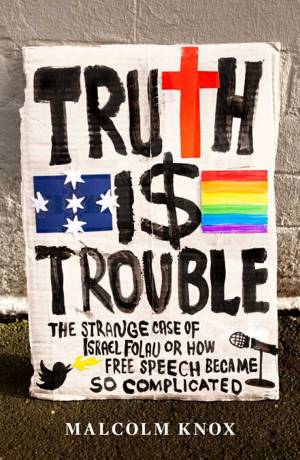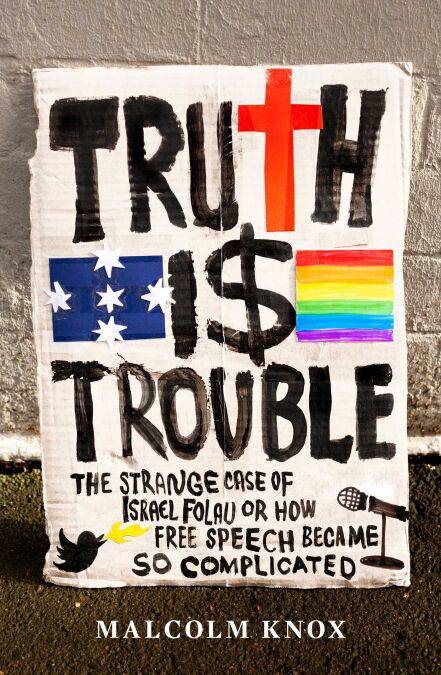
Bedankt voor het vertrouwen het afgelopen jaar! Om jou te bedanken bieden we GRATIS verzending (in België) aan op alles gedurende de hele maand januari.
- Afhalen na 1 uur in een winkel met voorraad
- In januari gratis thuislevering in België
- Ruim aanbod met 7 miljoen producten
Bedankt voor het vertrouwen het afgelopen jaar! Om jou te bedanken bieden we GRATIS verzending (in België) aan op alles gedurende de hele maand januari.
- Afhalen na 1 uur in een winkel met voorraad
- In januari gratis thuislevering in België
- Ruim aanbod met 7 miljoen producten
Zoeken
Truth Is Trouble E-BOOK
The strange case of Israel Folau, or How Free Speech Became So Complicated
Malcolm Knox
E-book | Engels
€ 13,41
+ 13 punten
Omschrijving
From the marriage equality debate to the COVID-19 lockdown, ‘free speech’ has become the new battleground in Australian society. What does the furore over one footballer’s social media postings reveal about how it got that way?
For a period in 2019, a tweet from rugby player Israel Folau became the biggest story in the nation. His urging of homosexuals to ‘repent’ or face damnation cost him his job and divided the country. Churches and politicians, employers and labour lawyers, sponsors and shock jocks, even people who had never heard of Folau – everyone had an opinion about his right to express his view, and many shouted it from the digital rooftop.
Now that the dust has settled, the real question emerges. When celebrities, and sportspeople in particular, are regularly ‘rehabilitated’ after incidents involving drink, drugs and domestic violence, why was it religious belief that got someone fired?
In this powerful and insightful work, triple Walkley Award-winning journalist Malcolm Knox explores how freedom of expression has become our national faultline. Truth is Trouble explores the rise of the religious right and its political consequences; the ‘right to be a bigot’ versus ‘cancel culture’; the changing nature of our rights at work and the separation between public and private lives; and above all, the incendiary power of social media. And by interrogating his own experience, Knox offers a convincing and heartfelt argument for the virtues of uncertainty and an open mind.
For a period in 2019, a tweet from rugby player Israel Folau became the biggest story in the nation. His urging of homosexuals to ‘repent’ or face damnation cost him his job and divided the country. Churches and politicians, employers and labour lawyers, sponsors and shock jocks, even people who had never heard of Folau – everyone had an opinion about his right to express his view, and many shouted it from the digital rooftop.
Now that the dust has settled, the real question emerges. When celebrities, and sportspeople in particular, are regularly ‘rehabilitated’ after incidents involving drink, drugs and domestic violence, why was it religious belief that got someone fired?
In this powerful and insightful work, triple Walkley Award-winning journalist Malcolm Knox explores how freedom of expression has become our national faultline. Truth is Trouble explores the rise of the religious right and its political consequences; the ‘right to be a bigot’ versus ‘cancel culture’; the changing nature of our rights at work and the separation between public and private lives; and above all, the incendiary power of social media. And by interrogating his own experience, Knox offers a convincing and heartfelt argument for the virtues of uncertainty and an open mind.
Specificaties
Betrokkenen
- Auteur(s):
- Uitgeverij:
Inhoud
- Aantal bladzijden:
- 272
- Taal:
- Engels
Eigenschappen
- Productcode (EAN):
- 9781760856151
- Verschijningsdatum:
- 31/10/2020
- Uitvoering:
- E-book
- Beveiligd met:
- Adobe DRM
- Formaat:
- ePub

Alleen bij Standaard Boekhandel
+ 13 punten op je klantenkaart van Standaard Boekhandel
Beoordelingen
We publiceren alleen reviews die voldoen aan de voorwaarden voor reviews. Bekijk onze voorwaarden voor reviews.









